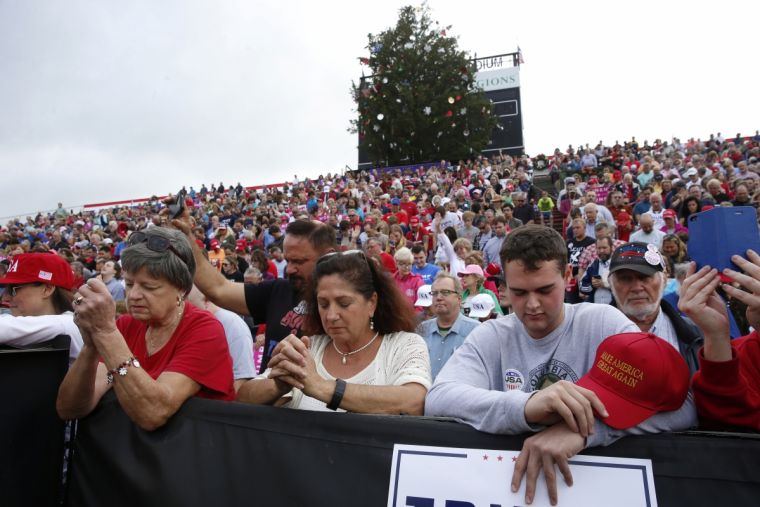Trump Wants To Let Your Pastor Do Party Politics. Here's Why It's A Bad Idea

Whenever anyone asked why 81 per cent of white evangelicals voted for Donald Trump in spite of his various obvious moral flaws, the answer was easy. It's the Supreme Court. Of course it wasn't as simple as that, but it was a factor.
Indeed this week, when Trump's pick, Neil Gorsuch, was announced, it was obvious that many evangelical leaders felt they were vindicated. Veteran conservative Christian campaigners such as Dr James Dobson (evangelical) and Bill Donohue (Catholic) greeted the choice with warm words. Even Dr Russell Moore of the Southern Baptist Convention, who has been an implacable opponent of Trump, described Gorsuch as a, "brilliant and articulate defender of constitutional originals".
Trump had given conservative Christians what they seemed to want. Whether they voted for him holding their noses or whether they were enthusiastic cheerleaders, they had got their pro-life justice nomination. This is what makes Trump's announcement about the Johnson Amendment at the National Prayer Breakfast so astonishing. He promised to get rid of the decades-old agreement which "prohibits tax-exempt organisations such as churches and other places of worship, charities and educational institutions from directly or indirectly participating in any political campaign in favor or against a political candidate".
The new president said: "I will get rid of and totally destroy the Johnson Amendment and allow our representatives of faith to speak freely and without fear of retribution."
This announcement is surprising for three reasons. First, there doesn't seem to have been much pressure or demand for it. Second, it's another blow to the idea of a secular form of government. Finally, and most worryingly for the Church, it's a dangerous move for the Christian gospel.
Trump's idiosyncratic regime has caught commentators off-guard since inauguration day. He is as unpredictable as president as he was as a candidate – just ask the Australian prime minister, with whom he had a stormy phone call this week. So, maybe we shouldn't be surprised that he announced his intention to get rid of the Johnson Amendment. Perhaps it's just another part of his strategy to bewilder opponents with a slew of executive actions while bolstering his base.
There seemed to be no concerted campaign from Christians to abolish the Johnson Amendment. In fact, when a Chicago University study asked evangelicals why they voted for Trump, it wasn't even one of the options they offered (it also noted that the Supreme Court appointment wasn't as vital as many reports have suggested). So, there was little demand for this change but Trump says he'll do it anyway.
This move also threatens the secular settlement in the US. It would allow pastors to speak out on a partisan political basis while their ministries and churches retain tax-exempt status (presumably how it is intended to work, though as ever with Trump, we're short on detail).
Churches have always been free to campaign on issues. But when they are allowed to weigh in directly on party politics, there is a risk they will become attached to political parties. The current system demands that religious institutions primarily serve their members rather than politicians. How easy will this be to uphold, once churches are out on the stump for candidates?
The main worry, though, is the effect on the gospel itself. The good news that the Church has to impart mustn't be compromised by its involvement with the political process.
The gospel is political, of course. It has deep political implications when we take it seriously. Jesus came to proclaim good news to the captives and sincere Christians will want to see massive reform in the criminal justice system, immigration, foreign policy, housing, health and myriad other areas as well as on the more high-profile topics such as life issues and sexuality.
The inherently political nature of the gospel compels us to act for the common good. It doesn't mean pastors should be partisan. In fact, partisan pastors and priests could actually put people off becoming members of a church. If your local congregation, through its leader, has essentially aligned itself with the Republicans, or the Democrats, then is there a place for you if you don't agree?
Baptists understand the risk of marrying party politics with Church better than most other denominations - it's intertwined with their history. This week the Baptist Joint Committe For Religious Liberty excoriated Trump's proposed idea. "Inviting churches to intervene in campaigns with tax-deductible offerings would fundamentally change our houses of worship. It would usher our partisan divisions into the pews and harm the church's ability to provide refuge," the statement said. "To change the law would hinder the church's prophetic witness, threatening to turn pulpit prophets into political puppets."
The marriage of faith and party politics needn't be problematic. I am a member of a political party and am actively involved in political campaigns. I know many fellow Christians who are – even church leaders. But the moment that allegiance to a political cause or even to a party becomes a test of orthodoxy, we are in trouble. The gospel is far bigger and more compelling than even the most important political cause.
Trump is opening the door to the downgrading of churches to mere branches of political parties. We've got to resist going down that path for the good of ourselves, our neighbours, our community and the kingdom of God.
Follow Andy Walton on Twitter @waltonandy











